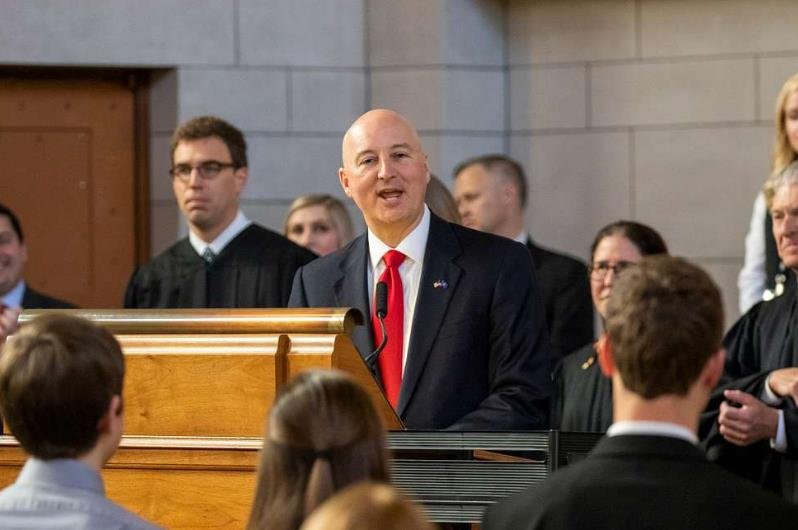Nebraska stands on the brink of a significant decision as state and petitioners await Judge Susan Strong’s ruling on the contested medical marijuana trial.
In a decisive turn of events, Nebraskans have overwhelmingly endorsed the legalization of medical marijuana. On Election Day two weeks ago, a remarkable seven out of ten voters cast their ballots in favor of the initiative. This resounding support underscores a growing acceptance and demand for medical cannabis within the state.
The petition garnered nearly 90,000 signatures, reflecting widespread public backing. However, the path to legalization is now mired in legal challenges that could potentially delay or derail the process. As the results await certification on December 2, all eyes are on Lancaster District Court Judge Susan Strong, who holds the power to shape the future of medical marijuana in Nebraska.
The Legal Crossroads: Judge Strong’s Dilemma
Judge Susan Strong faces a pivotal decision that could either uphold the voters’ mandate or introduce significant hurdles. Her ruling will hinge on the validity of the signatures collected for the petition. There are two primary outcomes she may consider:
- Dismissal of the Case: If Judge Strong determines that the Secretary of State failed to provide sufficient evidence of questionable signatures, she may dismiss the case entirely. This would mean the voters’ decision stands unchallenged.
- Demand for a New Trial: Conversely, if the judge finds credible evidence of massive fraud, she could mandate a new trial. In this scenario, the medical cannabis ballot sponsors would need to individually verify the legitimacy of each contested signature.
This decision is crucial as it sets the tone for how ballot initiatives are handled in the state, especially those with significant public support.

Controversy Over Signature Validity
The heart of the legal battle revolves around the legitimacy of the petition signatures. The Secretary of State’s office claims that there are enough questionable signatures to warrant further investigation, potentially disenfranchising tens of thousands of voters.
Petitioners’ Standpoint:
- Rule Adherence: Petitioners argue that they meticulously followed all procedural requirements.
- Questioning Numbers: They assert that the state’s numbers are flawed and do not accurately reflect the true count of valid signatures.
- Witness Credibility: The petitioners are critical of the state’s reliance on two witnesses, labeling them as lacking credibility and therefore unreliable.
State’s Argument:
- Fraud Concerns: The state contends that the sheer volume of signatures raises suspicions of fraudulent activities.
- Disenfranchisement Risk: They emphasize that without thorough verification, the integrity of the voting process is at risk.
Potential Implications of Judge Strong’s Ruling
Judge Strong’s decision will have far-reaching consequences for Nebraska’s medical marijuana landscape and the broader political climate.
If the Case is Thrown Out:
- Immediate Legalization: The voters’ decision to legalize medical marijuana would be implemented without further delay.
- Regulatory Framework: The state would proceed to establish regulations governing the cultivation, distribution, and use of medical cannabis.
- Economic Impact: Legalization could stimulate the local economy through job creation, tax revenue, and the growth of ancillary businesses.
If a New Trial is Ordered:
- Extended Uncertainty: The legalization process would face delays, prolonging the uncertainty for supporters and stakeholders.
- Increased Scrutiny: Medical cannabis advocates would need to invest more resources into proving the validity of their petition.
- Potential Precedents: A finding of fraud could set a precedent affecting future ballot initiatives and public trust in the petition process.
Community Reactions: A Divided Public
The impending decision has polarized Nebraska’s communities, sparking intense debates and discussions.
Supporters of Legalization:
- Health Benefits: Advocates highlight the therapeutic advantages of medical marijuana for conditions such as chronic pain, epilepsy, and cancer.
- Personal Freedoms: Many view legalization as a matter of personal choice and bodily autonomy.
- Economic Opportunities: Supporters point to the potential for economic growth and job creation within the cannabis industry.
Opponents of Legalization:
- Public Safety Concerns: Critics worry about the potential for increased substance abuse and impaired driving incidents.
- Moral and Ethical Objections: Some oppose marijuana use on moral or ethical grounds, believing it may lead to societal degradation.
- Regulatory Challenges: Skeptics question the state’s ability to effectively regulate and control the medical marijuana market.
These divergent perspectives reflect the complex nature of the issue, highlighting the need for a balanced and informed approach to policy-making.
The Road Ahead: Certification and Appeals
As the deadline approaches, the process moves swiftly towards certification. The El Paso County Clerk and Recorder’s Office is set to finalize the results by December 2. However, regardless of Judge Strong’s decision, the case is expected to face appeals, prolonging the resolution.
Timeline Overview:
- Election Day: Voters approve medical marijuana with 70% in favor.
- Judge’s Decision: Pending, expected shortly to allow time for potential appeals.
- Certification Date: December 2, when official results will be announced.
- Possible Appeals: Anticipated from both state and petitioners, extending the legal battle.
The judicial system’s handling of this case will be closely watched, not just by advocates and opponents, but also by other states considering similar initiatives.
The Broader Context: Marijuana Legalization Trends
Nebraska’s struggle is part of a larger national conversation about marijuana legalization. States across the U.S. have been grappling with the balance between public support and regulatory challenges.
National Trends:
- Growing Acceptance: More states are moving towards legalizing medical and recreational marijuana, reflecting changing societal attitudes.
- Regulatory Frameworks: States are developing comprehensive regulations to manage the cultivation, distribution, and sale of cannabis.
- Economic Considerations: The potential for substantial tax revenue and economic growth continues to drive legalization efforts.
Nebraska’s outcome could influence neighboring states and contribute to the evolving landscape of marijuana policy in the United States.
Legal Experts Weigh In
Legal analysts suggest that Judge Strong’s decision will hinge on the evidence presented regarding signature validity. The following factors are critical:
- Evidence Strength: The robustness of the state’s evidence against the petitioners will be scrutinized.
- Legal Precedents: Previous cases involving petition challenges may guide the judge’s ruling.
- Judicial Discretion: Judge Strong’s interpretation of the law and the specific circumstances of this case will play a significant role.
Experts anticipate a nuanced decision that carefully weighs both the procedural integrity and the democratic mandate expressed by voters.
Emotional and Social Ramifications
Beyond the legal and economic implications, the case carries significant emotional weight for the voters and petitioners involved.
Personal Stories:
- Voter Empowerment: Many supporters feel a sense of empowerment and validation through their collective effort to legalize medical marijuana.
- Petitioners’ Struggle: The petitioners have invested considerable time and resources, and a setback could be personally and financially devastating.
Social Dynamics:
- Community Unity: The initiative has brought together diverse groups advocating for medical marijuana, fostering a sense of community.
- Public Discourse: The case has ignited widespread public discourse, influencing opinions and shaping societal norms around marijuana use.
These human elements add depth to the legal proceedings, highlighting the profound impact of policy decisions on individuals and communities.
What’s Next for Nebraska’s Medical Marijuana Movement
As the legal process unfolds, the future of medical marijuana in Nebraska remains uncertain. The outcome of Judge Strong’s ruling will determine the next steps for advocates and opponents alike.
Potential Scenarios:
- Swift Implementation: If the case is dismissed, medical marijuana legalization could proceed without further obstacles.
- Prolonged Legal Battle: A decision requiring a new trial would extend the timeline, requiring additional legal efforts and advocacy.
- Policy Adjustments: Regardless of the ruling, the state may need to revisit and potentially revise its approach to petition validation and marijuana regulation.
Strategic Considerations:
- Legal Strategy: Petitioners may need to bolster their legal arguments and gather more robust evidence to support their case.
- Public Engagement: Continued public support and advocacy will be crucial in maintaining momentum for legalization.
- Regulatory Preparation: The state must prepare for potential regulatory changes, ensuring a smooth transition should legalization be upheld.
Nebraska’s journey towards medical marijuana legalization is emblematic of the broader national trends and challenges facing the cannabis industry today.
Jane Smith is a seasoned article writer specializing in cannabis-related content. With a keen focus on the latest trends, research, and developments in the cannabis industry, she brings a fresh perspective to her writing. Jane’s insightful articles delve into the medicinal benefits, legalization efforts, and evolving culture surrounding cannabis. Her engaging storytelling and informative approach make her a trusted source for readers seeking accurate and up-to-date information on all things cannabis.








